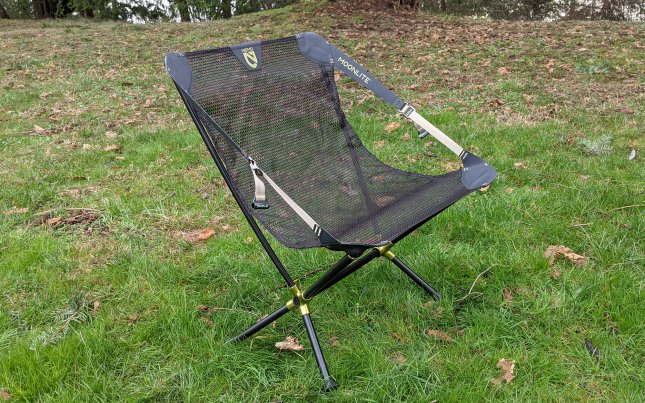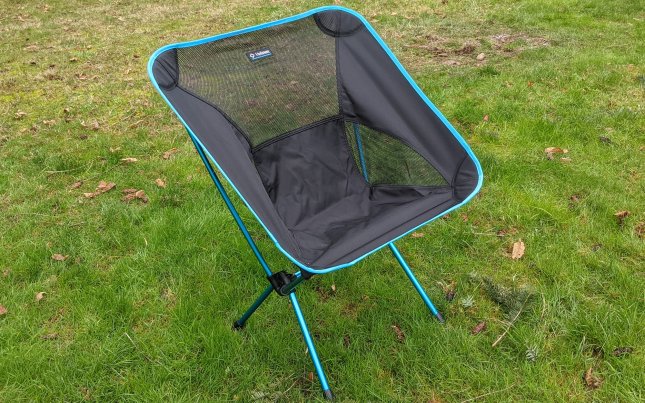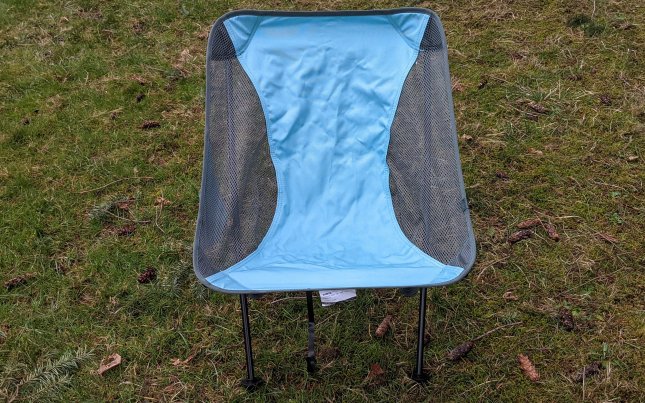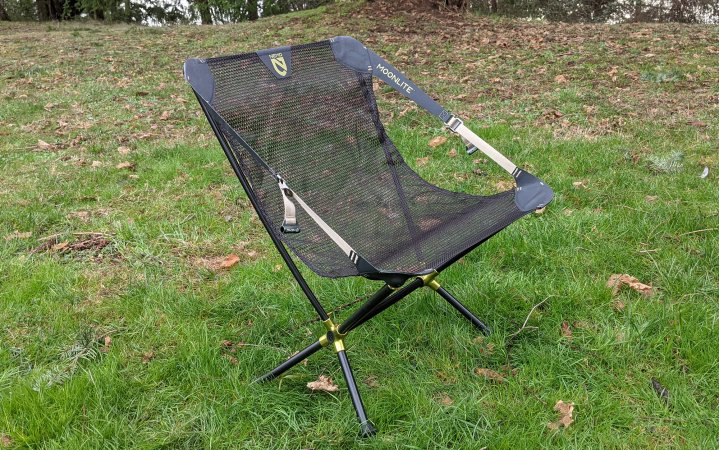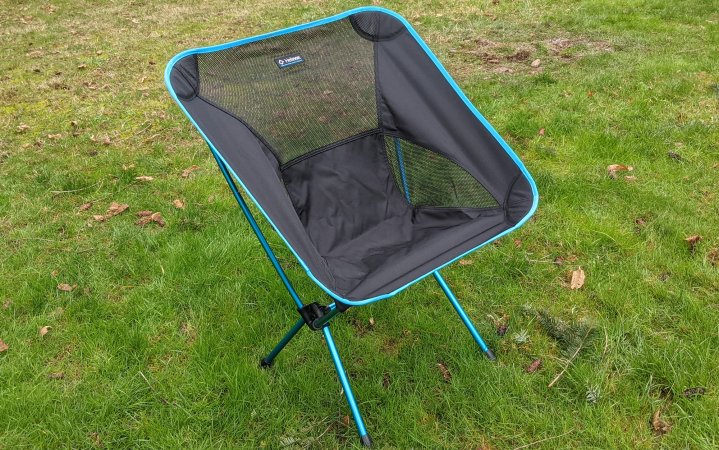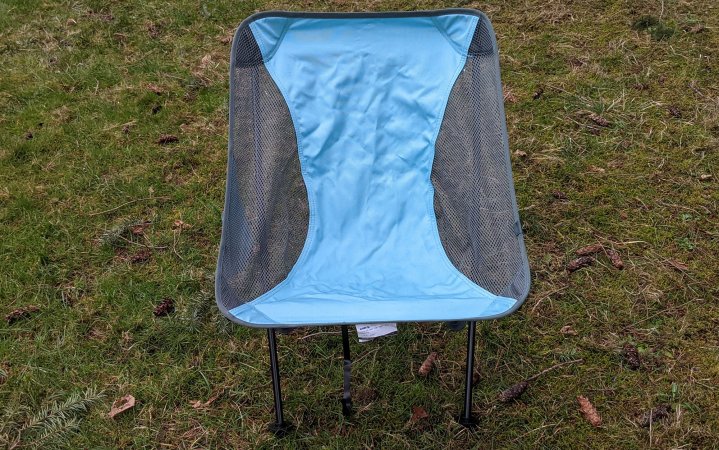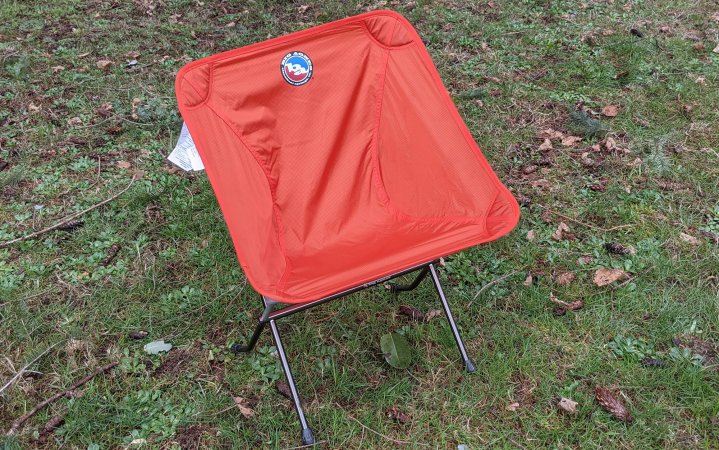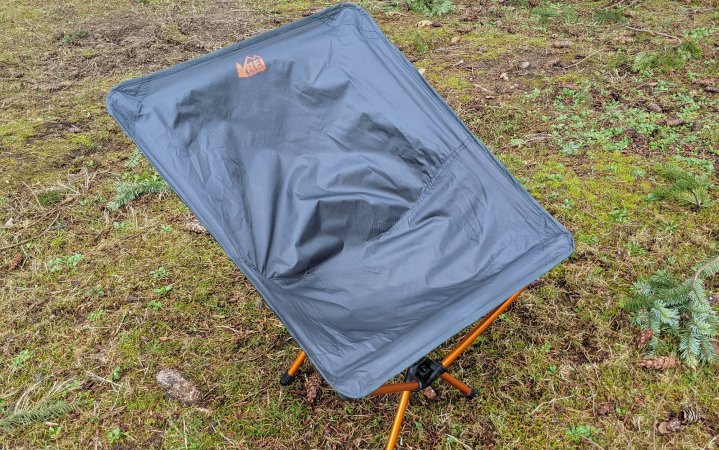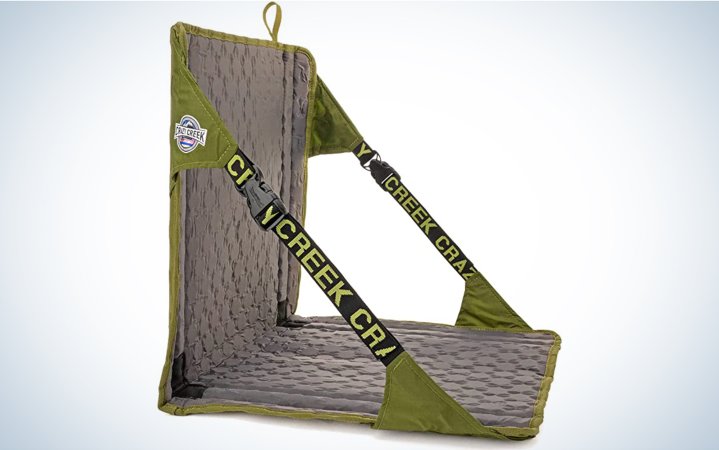We may earn revenue from the products available on this page and participate in affiliate programs. Learn More ›
If any piece of gear epitomizes “luxury item,” it’s the backpacking chair. If you’re carrying one of these, you likely also have some whiskey in a flask and plans to toast your trip in front of an epic vista or roaring campfire (maybe both) later that evening. To help you find the best backpacking chair to truly kick back and relax, I took some of the most highly regarded models out into the field for a head-to-head test.
- Most Comfortable: NEMO Moonlite
- Best for Big Guys: Helinox Chair One XL
- Best Value: Klymit Ridgeline Short
- Best Stability: Big Agnes Skyline UL
- Best Lightweight: REI Flexlite Air
- Best Budget: Crazy Creek Hex 2.0

Testing the Best Backpacking Chairs
The backpacking chairs in this test were evaluated on solid ground, at a sandy beach, and on muddy grass. I looked at comfort, ease of set up and packing, and stability in each environment.

Several of the chairs were additionally taken on a group winter backpacking trip to assess how well they worked in the field. To figure out which chairs work best for larger individuals, I looked at the weight limit and considered the functional width of each chair, and then had a 6-foot-3 individual sit down and stand up in the finalists several times to provide feedback.
The Best Backpacking Chairs: Reviews & Recommendations
Most Comfortable: NEMO Moonlite
Most Comfortable
NEMO Moonlite
Pros
- Open sides constrict the hips less than traditional-style backpacking chairs
- Adjustable back
- High weight limit for its size
Cons
- Tips forward more easily than other models in my test
- Expensive
Key Features
- Weight: 1 pound, 14 ounces
- Weight Limit: 300 pounds
- Seat Height: 10.5 inches
- Materials: Aluminum, polyester
The NEMO Moonlite is the backpacking chair that I am the most likely to bring on a backpacking trip because it balances comfort and weight better than anything else I tested. Whereas the seat of other of the best backpacking chairs are made entirely of fabric, the NEMO Moonlite is open at the sides. This results in less pressure against the side of the hips.

I found this difference especially notable after a long day on the trail. I was trying out a new pack, which meant (as sometimes happens) my pelvic bones were a bit bruised. While the other backpacking chairs felt tight around my hips and uncomfortable after only a few minutes, I happily sat in the NEMO Moonlite for over an hour. I also appreciated the adjustable straps at the sides, which allowed me to adjust the chair into more of an upright position while making dinner with the best camping cookware and then revert to a lounger when I was ready to kick back. This is also the only sub 2-pound chair in my test that had a weight limit of 300 pounds.
The biggest downside to this chair is that it is less stable than others I tested; in particular, it tends to pitch forward. While the back feet of the chair have a flat angle to them—which can be adjusted depending on the terrain—the front feet are rounded, and the legs are a bit shorter. This wasn’t especially noticeable when I was sitting, but I did need to exercise some caution when standing up.
Best for Big Guys: Helinox Chair One XL
Best for Big Guys
Helinox Chair One XL
Pros
- Very stable
- Wide seat that is minimally constrictive
- Highest weight limit of the backpacking chairs in my test
Cons
- Heavy
Key Features
- Weight: 3 pounds, 6 ounces
- Weight Limit: 320 pounds
- Seat Height: 18.5 inches
- Materials: Aluminum, polyester
If you’re on the tall side, then many of the best backpacking chairs look like a joke. Most of them even feel small to me, a paltry 5-foot, 5-inch individual. Fortunately, there’s the Helinox Chair One XL. When I had my husband—6-foot-3—sit in both this and the Big Agnes Mica Basin XL, he was unequivocal that this was the most comfortable chair, both to get in and out of and to actually sit in for long periods of time. In fact, this chair is so big and so comfortable that I would happily use the Helinox Chair One XL as my regular car camping chair.

In addition to its seat height and the highest weight limit in my test, the Helinox Chair One XL was also one of the most stable chairs I tested, excelling on a number of different terrains, including sand, mud, and firm ground. It was also the least forward-tipping chair of the bunch, which puts less strain on your core muscles when getting to standing position.
The obvious downside to this backpacking chair is that it’s heavy, over three times the weight of the best lightweight pick. But big guys know that the tradeoff with having a piece of gear that actually works for their frames is more than worth it.
Best Value: Klymit Ridgeline Short
Best Value
Klymit Ridgeline Short
Pros
- One of the lowest cost backpacking chairs in my test
- Surprisingly stable
- Has a pocket on the right-hand side for your phone
Cons
- Somewhat difficult to assemble
- Wobbly legs
Key Features
- Weight: 30 ounces
- Weight Limit: 265 pounds
- Seat Height: 13.5 inches
- Materials: Aluminum, polyester
If you’re curious about getting a lightweight backpacking chair, but balking at the price, then the Klymit Ridgeline Short is the chair for you. Testers were impressed by its comfort on the group trip and during the stability testing, it handled mud, sand, and firm ground just as well as chairs twice the cost.
The downside to the Klymit Ridgeline Short is that it was the most difficult to assemble out of the box. It took multiple people to stretch the fabric body over the aluminum frame. At one point, we wondered if we were going to break the frame just getting the polyester body on. Fortunately, we didn’t, and subsequent assembly of the chair was notably easier. That being said, it’s clear that the fabric of Klymit Ridgeline Short is stretchier than others in my test, which may be an issue if you are at the upper end of the 265-pound weight limit of the chair.
During the stability testing, I also noted that the bottom legs of the chair were somewhat wobbly. While this isn’t noticeable when sitting in the chair, where your body weight keeps the legs in place, it may point to long-term durability issues.
Best Stability: Big Agnes Skyline UL
Best Stability
Big Agnes Skyline UL
Pros
- Very stable for its size
- Fairly lightweight
Cons
- Expensive
Key Features
- Weight: 1 pound, 12 ounces
- Weight Limit: 275 pounds
- Seat Height: 15 inches
- Materials: Aluminum, nylon
The Big Agnes Skyline UL was the most popular backpacking chair with my kid tester due to one key feature: It’s very difficult to tip over. While other models had a tendency to tip forward or tip backward when the user is leaning in one or the opposite direction, the Skyline UL is remarkably stable. During testing it was nearly as stable as chairs twice its weight. When looking at the chair’s construction, it’s clear why. First, the legs cover a larger square area than others at this size and weight. The back legs also have a slight inward bend to them, making it all but impossible to tip over backward.

While the Big Agnes Skyline UL is very stable, it has a narrower seat than other models at this size, and may be uncomfortable for backpackers with wider hips, despite its weight limit of 275 pounds.
Best Lightweight: REI Flexlite Air
Best Lightweight
REI Flexlite Air
Pros
- Very lightweight
- Affordable
- Easy to assemble
Cons
- Least stable chair I looked at
- Constrictive seat
Key Features
- Weight: 1 pound
- Weight Limit: 250 pounds
- Seat Height: 11 inches
- Materials: Aluminum, nylon
I know what you’re thinking: “But what’s the lightest backpacking chair?” I want to try and talk you out of this. The truth of the matter is that the lightest backpacking chair is the backpacking chair you leave at home. It’s the log you find at the edge of your campsite, a patch of pine needles, or an unusually flat rock. If you’re worried about how a backpacking chair is going to affect your base weight, just skip it.
You lose out on a backpacking chair’s ability to function properly when you push the weight too far down. The REI Flexlite Air does a good job of showing the downsides. At 16 ounces, it’s the lightest backpacking chair available—even lighter than the popular Helinox Chair Zero. But it was easily the least stable chair of everything I tested, and was even prone to flipping sideways on firm ground. While most backpacking chairs have a support bar running along the width of the chair, the REI Flexlite Air’s runs front to back. This, combined with the chair’s shorter-than-average legs, gives it a propensity to tip sideways without much effort.

After comparing side-by-side, I also found that the seat of the REI Flexlite Air was significantly more constricting than other backpacking chairs, hugging my hips more than was comfortable after a long day on the trail. The lack of tension in the fabric, which is designed more like a pouch than a seat, also made it more difficult to stand up.
One area where the REI Flexlite Air doesn’t cut corners is in durability. I’ve had this chair for over four years and it works as well now as it did when I first purchased it.
Best Budget: Crazy Creek Hex 2.0
Best Budget
Crazy Creek Hex 2.0
Pros
- Lightweight
- Inexpensive
- Easy to use
Cons
- Not technically a chair
- Larger packed size
Key Features
- Weight: 1 pound, 4.8 ounces
- Weight Limit: 250 pounds
- Seat Height: 0 inches
- Materials: Nylon, foam, carbon fiber
If, after reading the above reviews, you’ve decided that a backpacking chair is more trouble than it’s worth, then the Crazy Creek Hex 2.0 might be what you want instead. This rollable seat weighs just a hair more than the REI Flexlite Air and is significantly more comfortable and stable. It gets that way by dispensing with the legs of the chair entirely and sitting directly on the ground. Adjustable nylon straps running across the sides of the chair allow you to dictate the angle of the seat, so that you can prop yourself when eating or lay back to lounge.

Of course, the downside to a seat like this is that you are sitting essentially on the ground, so any mud or muck is going to transfer directly to the seat (and possibly your legs). It’s also more of a chore to get into and out of (although a back and forth rocking motion can give you the momentum you need to propel yourself up).
How to Choose the Best Backpacking Chair
Weight
A backpacking chair is considered a luxury item, so backpackers dedicated to cutting their pack weight should give this one a pass. However, if you’re planning to cover less than 10 miles a day then a backpacking chair can make a big difference to your comfort at camp. While there are several lightweight and ultralight backpacking chairs on the market, these tend to be significantly less comfortable than models around the two pound mark. Consider your priorities (weight versus comfort) before making a final choice.
Design
Most backpacking chairs follow a similar design. Its main frame functions similar to a tent pole, with metal bars connected by a bungee cord snapping together. Most backpacking chairs have a center stability pole that eight other poles snap into in a criss-crossing pattern: four that support the chair on the ground, and four that support the fabric body of the chair. The fabric body of the chair is then stretched onto the four top poles. Despite these design similarities, during testing I found that small variations, like the direction of the main support pole or a slight bend on the back legs, made a big difference in the stability of each chair.
Price
There is a surprising range in the price of backpacking chairs, from $60 all the way up to $200.
Comfort
During testing, it was clear that larger chairs were more comfortable than smaller chairs, but there is a wide range of variability within that. Consider other construction features, like the shape of the seat, cut-outs, and adjustable straps as well.
FAQs
Backpackers that are routinely covering upwards of 20 miles in a day are unlikely to find a backpacking chair worth the weight. The comfort it provides at the end of the day will not outweigh the extra pound or three on their backpack. Conversely, backpackers or bikepackers that spend a larger percentage of their day at camp, or even basecamp for several days at a time, will almost certainly find the creature comfort of a backpacking chair worthwhile. Like the best backpacking pillows, whether or not a backpacking chair is worth it depends on your perspective and needs.
The biggest difference between a backpacking chair and a camping chair is their weight and size. While both are collapsible, backpacking chairs typically take up the packed volume of a 1.5-liter Nalgene bottle, while camping chairs can be easily twice or even three times that size. Backpacking chairs are also notably lighter. When in use, camping chairs will provide more stability and a wider seat than the average backpacking chair.
While the lightest weight backpacking chairs are around a pound, two pounds is a more typical weight. The lightest backpacking chairs tend to be less comfortable and less stable than their heavier counterparts.
Seat pads are made from closed-cell foam, the same as found in some of the best backpacking sleeping pads. These provide some insulation and some cushion from the ground, but do not provide back support.
At one pound, the lightest backpacking chair is the REI Flexlite Air, which squeaks out the Helinox Chair Zero by a mere two ounces.
Final Thoughts
The best backpacking chairs are lightweight, comfortable, and easy to use. Our top picks were tested in the field using side-by-side comparisons in the terrain that backpackers travel in most often.
- Most Comfortable: NEMO Moonlite
- Best for Big Guys: Helinox Chair One XL
- Best Value: Klymit Ridgeline Short
- Best Stability: Big Agnes Skyline UL
- Best Lightweight: REI Flexlite Air
- Best Budget: Crazy Creek Hex 2.0

